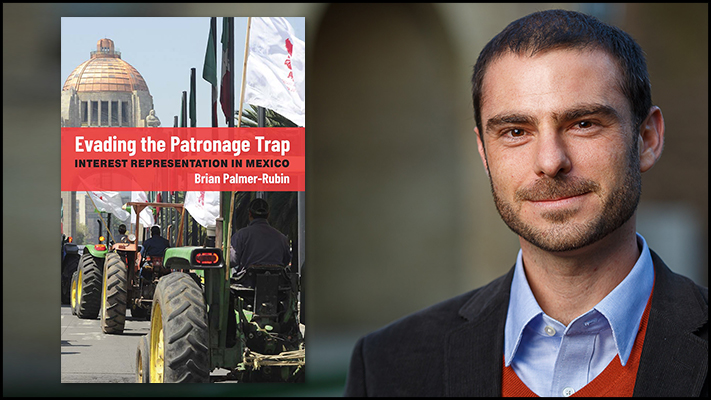By Dr. Brian Palmer-Rubin, assistant professor of political science

Why have Latin American democracies proven unable to confront the structural inequalities that cripple their economies and stymie social mobility? Evading the Patronage Trap contends that we may lay the blame on these countries’ systems of interest representation, which exhibit “biased pluralism,” a system in which the demands of economic elites—especially large corporations — predominate. A more inclusive model of representation would not only require a more encompassing and empowered set of institutions to represent workers, but would also feature spaces for non-elite producers — such as farmers and small-business owners to have a say in sectoral economic policies.
Learn more or purchase this book on University of Michigan Press
Dr. Palmer-Rubin answered some questions about his new book, including where the idea for the book came from, his favorite part of the writing process and what he hopes the book can accomplish.
This book provides a new explanation for economic inequality in Mexico — and the developing world more broadly — by unpacking the obstacles that stand in the way of effective representation by organizations representing the poor and middle classes.
The field research — which I conducted mostly over a decade ago — was the most enjoyable part of this book. There is no substitute for the epiphanies that occur in the field, when you see conventional social science theories challenged by empirical reality. I still enjoy rereading interview transcripts and reliving those moments of discovery.
This book was inspired by an initial disappointment with the Mexican left. I first came to Mexico in 2007 on a Fulbright Scholarship and was eager to study that country’s storied history of labor and peasant movements. I was surprised to find that many of these organizations were absent from the important policy debates that shaped the economic prospects of the masses—trade policy, labor policy, industrial policy. These organizations instead concentrated their efforts on mobilizing for political parties that often enacted policies that conflicted with the organizations’ economic interests. Eventually, this book became my attempt to explain this pernicious outcome, which I refer to as “the patronage trap.”
My hope is to help put interest representation back on the agenda as a potential explanation for trenchant inequality in Latin American democracies. Much existing research has analyzed the consequences of the “neoliberal” economic model and the adoption of social policies meant to compensate the “losers” in market-based economies. I try to take a step back and explain how this failed economic model has been allowed to persist for so long in so many countries by focusing on the actors who ordinarily would offer opposition, but are all too often silent.
Yes, this is my first book. It is based on my doctoral dissertation from the University of California, Berkeley (political science). In addition to this book, I have written several academic articles about civil society organizations, political parties and economic policy in Latin America.
I also research Mexico’s access-to-information system as part of a collaborative public scholarship project, including the design of an interactive website and significant collaboration with Mexican government agencies and civil society organizations.
My second book project, currently underway, analyzes the politics that construct markets for high-value agricultural exports in Mexico: avocados, berries, tequila and mezcal.
A core course that I teach at Marquette is the Political Economy of Development, which analyzes the interplay between political, economic and social institutions in the Global South. In teaching the course, I frequently draw on my experiences conducting research for this book, particularly to emphasize the difficulty of achieving authentic civil society participation in policymaking. Teaching this course has also helped me refine the way that I describe the contribution of this book, by framing it in ways that relate to central debates in the political economy literature.
If you have recently published a book, or if you have one coming out, we would like to feature your publication in an upcoming Marquette Bookshelf feature. More information on the submission process is available online.
Book Details
- Publisher: University of Michigan Press (Aug. 8, 2022)
- Language: English
- Hardcover: 342 pages
- ISBN-10: 0472075446
- ISBN-13: 978-0472075447


